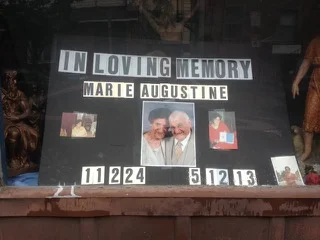Mother's Day: Remembering What My Italian Mother Taught Me
"The loss of a mother can never be replaced, but the love of a mother can never be lost. —Kelly Flannery
We had dinner with our new friends, Ron and Gail last evening who had downsized around the same time we did, to the same gated community we now call home. One of the topics we spoke about was Mother’s Day. I had said for me Mother’s Day is bittersweet. I lost my mother on Mother’s Day. Ron said, “So did I.” In that moment I had a sobering thought that death never takes a holiday and doesn’t play favorites. When it’s your time, it's your time.
Mom was a beautiful woman, and had a smile that would light up a room; a laugh that was both robust and contagious; and possessed the sharpest of wits that would have you in stitches. She was also a hospitable host to family and friends and had the most charming Italian accent. I used to love going back to the Sicily with her to visit our ancestors.
As a devout Catholic, mom was confident that there was a room waiting for her in the Afterlife. I feel safe in saying that at the ripe old age of 88, bodily ailments and dementia setting in, she was ready to meet her maker.
It’s been four years since she has passed, and I have come to the realization that the best way to cope with having lost my mother is to change the narrative. Instead of looking at it as “my” loss, I chose to refect upon who she was, what she taught me, and the tools at my disposal to deal with the wave of melancholy that rears its head from time to time.
Mom taught me to have respect for my elders.
Mom urged me to stay in college when I was thinking of dropping out.
Mom taught me there was a power bigger than myself.
Mom told me stories of her life in Sicily before coming to America in 1947.
Mom taught me how to hug with a heartfelt embrace.
Mom taught me how to be strong when things weren’t going my way.
Mom nurtured and protected me the best she knew how.
Mom was patient even when I pushed her away.
Mom didn’t give up on me even when I would fall flat on my face.
Mom always tried to cheer me up when I was sad.
Mom taught me the meaning of hard work and sacrifice.
She taught me how to persevere and encouraged me to believe in my dreams.
She was proud of my accomplishments, and most of all she gave me unconditional love.
Common to many religious traditions are Light offerings, contemplation and prayers. They symbolize removing the darkness that death symbolizes and replacing it with the light of wisdom.
I found the single most effective ritual to ease the pain and sadness of a loss is to share it with others who are going through the same thing by employing an ancient Tibetan practice called Tonglen that has gained popularity in the West. It was taught to me and Cecile by Pema Chodron, an American born former elementary school teacher who became a Buddhist nun and utitilizes the medium of Breath. It replaces the dynamics of fear, grief or anger with compassion for oneself and our fellow human beings.Though it may seem counter-intutiive at first, one breathes in the pain and suffering of one’s self and and others who are going through difficult times. Relief is offered with the out-breath to anyone who needs it whether you know them or not. The experiential message of tonglen is that it reduces the feeling of isolation. It is a universal law that at any given time all of us suffering and joy. This is a way to share the burden of grief, and in doing so cuts it in half.
Mom, thank you for all the sacrifices you made for your family both here and abroad. Love you.



